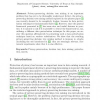Free Online Productivity Tools
i2Speak
i2Symbol
i2OCR
iTex2Img
iWeb2Print
iWeb2Shot
i2Type
iPdf2Split
iPdf2Merge
i2Bopomofo
i2Arabic
i2Style
i2Image
i2PDF
iLatex2Rtf
Sci2ools
ETRICS
2006
2006
Privacy-Preserving Decision Tree Mining Based on Random Substitutions
Privacy-preserving decision tree mining is an important problem that has yet to be thoroughly understood. In fact, the privacypreserving decision tree mining method explored in the pioneer paper [1] was recently showed to be completely broken, because its data perturbation technique is fundamentally flawed [2]. However, since the general framework presented in [1] has some nice and useful features in practice, it is natural to ask if it is possible to rescue the framework by, say, utilizing a different data perturbation technique. In this paper, we answer this question affirmatively by presenting such a data perturbation technique based on random substitutions. We show that the resulting privacy-preserving decision tree mining method is immune to attacks (including the one introduced in [2]) that are seemingly relevant. Systematic experiments show that it is also effective.
Data Perturbation Technique | Decision Tree Mining | ETRICS 2006 | Privacy-preserving Decision Tree | Security Privacy |
Related Content
| Added | 22 Aug 2010 |
| Updated | 22 Aug 2010 |
| Type | Conference |
| Year | 2006 |
| Where | ETRICS |
| Authors | Jim Dowd, Shouhuai Xu, Weining Zhang |
Comments (0)

